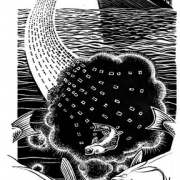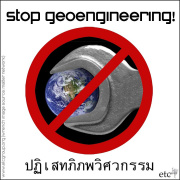La ONU discutirá soluciones de ciencia ficción para el cambio climático en reunión sobre biodiversidad
Submitted by ETC Staff on
Mientras funcionarios de 193 países hacen el recuento de la dramática pérdida de biodiversidad en la 10a Conferencia de las Partes del Convenio sobre Diversidad Biológica en Nagoya, Japón, del 18 al 29 de octubre de 2010, el Grupo ETC advierte que se están promoviendo “remedios técnicos” muy riesgosos como la solución a la crisis climática, y que deben congelarse.
La reunión global, que marca el Año Internacional de la Biodiversidad, debatirá una moratoria de facto sobre la liberación al ambiente de las formas de vida artificiales (una variante de la ingeniería genética extrema, promovida por la industria como fundamento de una “economía verde”) y también se discutirá una prohibición de las actividades de geoingeniería (manipulación en gran escala de los sistemas de la Tierra). Las leyes internacionales existentes no tienen control adecuado para estas controvertidas nuevas tecnologías.
El Grupo ETC presentará tres nuevos informes y celebrará tres eventos en Nagoya sobre esos remedios de ciencia ficción, en los cuales denunciará los intereses que los respaldan y los riesgos inherentes de desarrollarlos sin control alguno.
Civil Society Calls for Moratorium on Geoengineering
Submitted by ETC Staff on
One of the hottest issues before the Convention on Biological Diversity (CBD) in Nagoya, Japan is a set of crucial decisions that could bring about a moratorium on proposed experiments in geoengineering, a set of high-risk climate technofixes. At the opening plenary of the conference, the CBD Alliance on behalf of civil society organizations called for a moratorium on geoengineering experiments.
UN to Confront Sci-fi Climate Solutions at Biodiversity Meeting
Submitted by ETC Staff on
As environment ministers from 193 countries take stock of the globe’s dramatic loss of biodiversity at the Convention on Biological Diversity (CBD) in Nagoya, Japan next week (18-29 October 2010), ETC Group warns that high-risk “technological fixes” that claim to hold the key for solving the climate crisis should be put on ice.
The global meeting, marking the International Year of Biodiversity, will debate a de facto moratorium on the release into the environment of synthetic life forms (a form of extreme genetic engineering marketed by industry as the building blocks of the “green economy”) and on geoengineering activities (massive intentional manipulations of the Earth’s systems). Existing international law has no adequate controls for these controversial new technologies.
ETC Group released three new reports on these technofixes, explaining the interests behind them and the risks inherent in their uncontrolled development.
Artículo en Nature Communications muestra las mentiras de los defensores del 'biochar'.
Submitted by ETC Staff on
Boletín de prensa colectivo de African Biodiversity Network, Amigransa Venezuela, Biofuelwatch, CESTA (Amigos de la Tierra El Salvador), COECOCEIBA Costa Rica, Econexus, Grupo ETC, FASE Brasil, Gaia Foundation, Global Forest Coalition, Global Justice Ecology Project, Latin American Network against Monoculture Tree Plantations (RECOMA), Observatorio de Conflictos Ambientales (OLCA) Chile, Otros Mundos Mexico, Rettet den Regenwald Alemania, Salva la Selva España, Save America's Forests, Sobrevivencia (Amigos de la Tierra Paraguay) y el Movimiento Mundial por los Bosques WRM
Nature Communications article shows 'true colours' of biochar advocates
Submitted by ETC Staff on
Press Release by African Biodiversity Network, Amigransa Venezuela, Biofuelwatch, CESTA (Friends of the Earth El Salvador), COECOCEIBA Costa Rica, Econexus, ETC Group, FASE Brasil, Gaia Foundation, Global Forest Coalition, Global Justice Ecology Project, Latin American Network against Monoculture Tree Plantations (RECOMA), NOAH Food and Agriculture (FoE Denmark), Observatorio de Conflictos Ambientales (OLCA) Chile, Otros Mundos Mexico, Rettet den Regenwald, Salva la Selva, Save America's Forests, Sobrevivencia (Friends of the Earth Paraguay) Timberwatch Coalition and World Rainforest Movement
Twenty one groups today expressed their dismay at an article by leading biochar advocates, published by the science magazine Nature, which proposes that an area larger than the land mass of India could be turned into charcoal plantations in the name of climate change mitigation.[1] The paper’s own figures contradict the authors’ claims that biochar will not lead to large-scale land grabbing in the global South.



